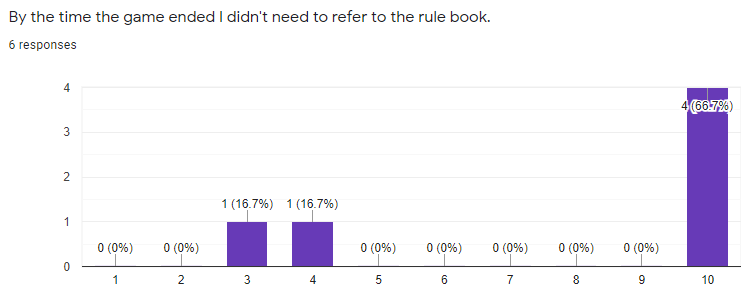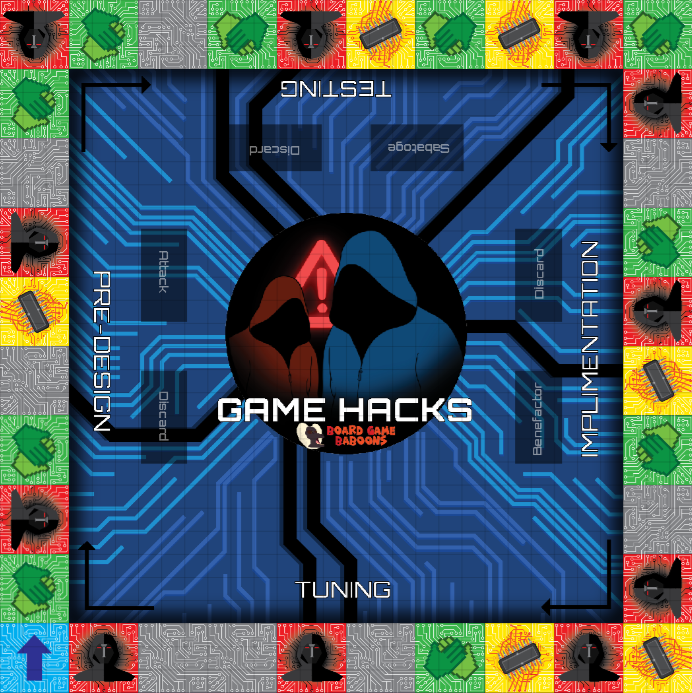Dev Log 8: Playtesting and Production
Introduction
These past couple weeks have been jam packed with work. Even at the time of writing my last dev log, we were waist deep in production tasks and putting out fires. This dev log is going to be a brief recap of my team, the Board Game Baboons, snuffing out all of those fires, filing all of those papers, testing those testers, and producing this production! I'm very happy to say that we're in a great state and are nearing a complete game. Imagine that. A board game made by baboons, all working remotely.
Playtesting
Let's juggle the playtesting bill first. Our team has been working extensively on perfecting the game loop and sequences of play. Using our modified beat chart tool that was discussed in previous journals, we've been able to actually plot out and construct a well functioning iteration on the board. We've done some in-team testing already, but we needed some concrete observations from other players to judge the clarity of the rules, the information on the cards, and goal of the game. We ran two playtests of different groups of people with no prior knowledge of, or experience with, the game. The testing procedure was as follows:
- Greet the testers
- Talk about the game
- Thank them for participating.
- Pre-test survey
- Playthrough of the game
- Post-test survey
- Thank them again and depart.
During step 5, the players were asked to speak their minds when they were going through the rules and setup. This is immediately where results differed between the groups.
Playtest 1
This playtest resulted in great confusion over the rules, showing that the words we had written had a lack of comprehensiveness. The playtests frequently re-read the rules to determine the proper steps to playing, what they could and couldn't do, and assumed some optional steps were mandatory. Moderator intervention was made in order to correct the mistake so the playtest could continue. Furthermore, the players claimed that they had fun playing the game, but were too afraid of attacking each other and prolonging the play experience. This already provided some conflicting details that our team began to further analyze and transform into usable information.
Playtest 2
In contrast, the participants in playtest 2 had very little difficulty reading the rules through once as a team, then proceeding to start the game within 5 minutes of being left to their own devices. Moderator intervention was still called in to provide a ruling on what should be done when a deck of cards ran out. The moderator quickly proposed to keep the decks empty and instead treat each relevant deck drawing tile as a neutral tile. This prevented players from continuing to stockpile the 'Sabotage cards' which could be used against other players. More useful information was collected from this outcome.
Results
By the end of both playtests, we had a split in the confidence in each player about the rules as seen in these results from the survey:

Despite the lack of understanding some of the players experienced, the repetitive nature of the board game's sequence of play was able to teach them everything it had to offer, as seen in this survey result:

The outliers in this case were the same ones that had difficulty with the rules in playtest 1. In order to refine the rulebook, we dug into the rules present in other board games to lock down what we might be missing. The big factor we discovered was the lack of graphics and helpful diagrams that other rule-sheets come designed with. Being able to use concise wording and intuitive graphics to convey all of the rules will be the best place to help with reading comprehension and visual learners together. Using this, we can teach them more information through the repetitive cycle of gameplay.
Production
As far as production has gone, we've made great strides in refining our development workflow and pipeline. We had a brief team reform after one of our group members went AWOL. This came as a shock to all of us, but we had anticipated this. Our risk analysis work had actually included the loss of a team member and the measures we knew we had to take in order to safeguard the timely production of our board game. Honestly it was completely stress free once we actually went through the proper steps. I've taken on a couple roles and switched some with other group members, but now our team is completely reorganized and in a functioning state. We've also taken on a new team member to help fill the gap in the art department. This artist has come in handy alleviating the workload on what would've been our dedicated artist, allowing her to focus more on the design side of things with the rest of us. This has kept production afloat and chugging along healthily.
Now, what did we actually do?
A lot. But we can't just list it all here.
So I'm going to go over some highlights and what value they had for the project:
Rulebook Layout
The rulebook has undergone massive revisions and is now seeing treatment to be turned into an infographic. Currently our lead artist has the graphical layout all worked out to provide the most comprehensive structure for our information. This should help with the issues seen in the playtests above.
Artwork Overhaul
The entirety of our game has seen a massive improvement in art direction and style. We've definitely come a long way from our primitive shapes and primary colours. The attractive board, tiles, and pieces should be distinct enough to not offer any confusion for the intention of, and difference between, tiles. This should also provide a difference for players of certain levels of visual impairment, being able to distinguish between the primary colours and different symbols.

Design Workflow
Due to the previously mentioned team member mishap, we've had to relocate our kanban and gantt charts to a different project planning service. We selected Notion.so to be our place to plot and plan Game Hacks. The best thing I can say about it is that it's essentially a lite version of Jira, and the worst I can say about it is that it's pricey for large teams. However, given our team size of 4 people, this isn't an issue for us. We specifically chose Notion due to my own experience with it and a suggest made by our Professor. I've already been using Notion.so extensively for planning out assignments and my tasks for my job. Solid 4.5 / 5.
Overall Design
Finally it comes down to the actual gameplay and implementation of the most crucial material for our game. This board game is supposed to be informative and helpful. The goal is to teach people the risks of not having good cybersecurity and the consequences of being unsafe with your companies people, property, and information. In the current version, we don't quite have much of that. It's present, but in such small doses that the players hardly understand what the purpose of anything happening is. They are just having fun managing resources and trying not to 'get got'. So what we've done is completely rebalanced the cards, applied new flavorful information sourced from real research papers on cybersecurity, and added a brand new pillar to our design principles. We now have a third pillar: Cybersecurity.
The goal of this pillar is to help enforce this idea that cybersecurity is extremely important. The goal of this project is to teach people about it and how it affects the game industry. So, Cybersecurity will be our new center-stage pillar to help us support any decisions and changes we make moving forward. We're in a good place for development, so a change like this can only strengthen our design.
Next Steps & Conclusion
Our team has managed to accomplish a lot, but there's still so much to do moving forward. Our new rules infographic and rebalances need to be tested. Aside from that, we still need to make a box to put the whole board game. We're hard at work talking to manufacturers already. Once we have all of the assets completed and the information, values, and game rules, are all finalized, we're ready to move into a release. So far this has been the most organized and well executed project I have been a part of. Fingers crossed it stays that way. That's all for now!
Game Practice Dev Logs
A recap and debriefing on game design lessons I've learned in this week.
| Status | Prototype |
| Category | Other |
| Author | MisterSpectre |
| Tags | design-practice, development-log, dev-log, game-practice, info, information, journal, solo |
More posts
- Dev Log 11: Post-ProductionApr 04, 2022
- Dev Log 10: Planning and ImplementationMar 21, 2022
- Dev Log 9: Playtesting and Production IIMar 11, 2022
- Dev Log 7: Pre-Production PrinciplesJan 30, 2022
- Dev Log 6: Learning Reflection - How will this prepare me for next semester?Nov 26, 2021
- Dev Log 5: Scheduling My WorkNov 19, 2021
- Dev Log 4: User Centered DesignNov 13, 2021
- Dev Log 3: Beat MappingOct 22, 2021
- Dev Log 2: Project ProposalSep 30, 2021
Comments
Log in with itch.io to leave a comment.
Way to go Superstar